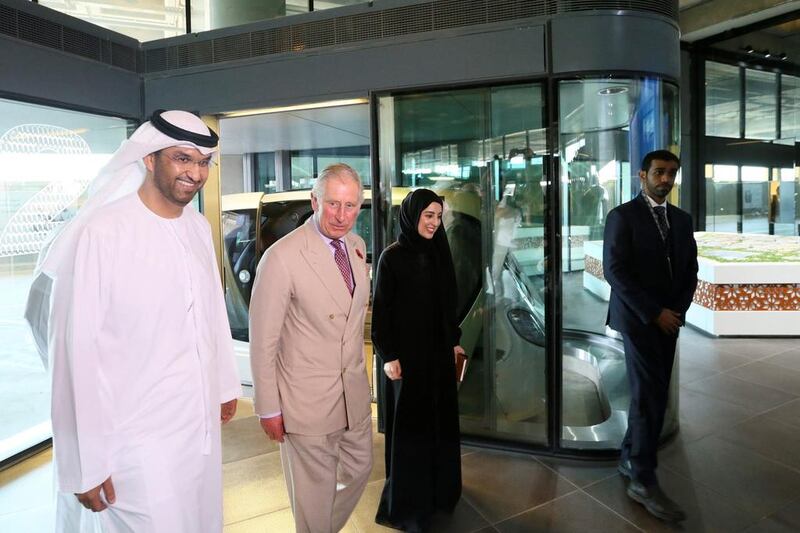ABU DHABI // Sustainability and the development of young people were at the heart of discussion between students at the Masdar Institute of Science and Technology and the UK’s Prince Charles on the second day of his state visit.
Shortly after arriving in one of the institutes’s eco pods, guided by magnetic fields around the sustainable city on the outskirts of Abu Dhabi, the prince was given a guided tour of the facility before meeting students.
For more than 40 years, the heir to the British throne has been an advocate of nurturing young people through his charitable work with the Prince’s Trust in the UK.
Financial support for start-up companies is paired with a mentoring programme from business people in the programme. It has helped thousands of young people, with the economy benefiting from jobs and taxable income.
Charles met Minister of State for Youth Affairs, Shamma Al Mazrui, to discuss the success of the programme and how it could be replicated in the UAE.
“We have been working with the business sector in the UK to work out where the skills shortages are so that we can join up the dots,” Prince Charles said.
“We have been speaking with relevant businesses as it seems the key challenges in the Middle East and many other parts of the world is youth unemployment.
“The most successful economies are built on the successful foundations of small and medium-sized businesses.
“I have been so encouraged over the past 40 years or so to see how many of these young people have done so well, and (some) have gone on to sell their own businesses for £70 million or so and then give back to the next generation.”
Prince Charles, who is visiting with his wife, Camilla, the Duchess of Cornwall, has long championed sustainability.
That ambition crucially relies on the next generation of business minds to help develop sustainable energy solutions for the future, he said,
“The main challenge facing us all now is how we can de-carbonise our economy, radically,” he said.
“We have heard from climate scientists this year that global temperatures have risen, and we are heading towards extremely dangerous territory.
“The key now is to support the technology and innovation being developed to support that idea of decarbonising economies.
“We are reliant on young people to help develop these technologies, so they are hugely important. We need to learn how to live in harmony with nature, rather than remove nature from the equation altogether.”
An example of research projects at Masdar led by youth was an energy-efficient membrane used to desalinate sea water, which could provide clean water.
Ms Al Mazrui opened a discussion on green issues, attended by Prince Charles, students, Dr Sultan Al Jaber, chairman of Masdar, and chief executive Mohamed Jameel Al Ramahi.
She said the UAE was following the example set by the Prince’s Trust in harnessing the potential of young people.
“In the UAE we too are greatly invested in youth and they are viewed as the global emerging market with huge potential,” she said.
“Young people are the future engineers of sustainability and the UAE youth strategy is 100 per cent youth-driven.
“His Royal Highness is a visionary who has long been concerned with preserving the planet’s resources. They should not be used at the expense of our tomorrows. His work has shown decisive action to better align the private and public sector by establishing accountable sustainability projects.”
Omar Younis Asad, a Phd student at the Masdar Institute, encouraged other young people to pursue green initiatives and think about how they can reduce their carbon output.
“We should all care for our sustainability as it promotes our education and concerns all stakeholders; it will push us forward to make the right choices and to do the right thing,” he said.
“We should all be focusing on developing and capitalising on long-term strategies that are sustainable for the environment around us.”
nwebster@thenational.ae







